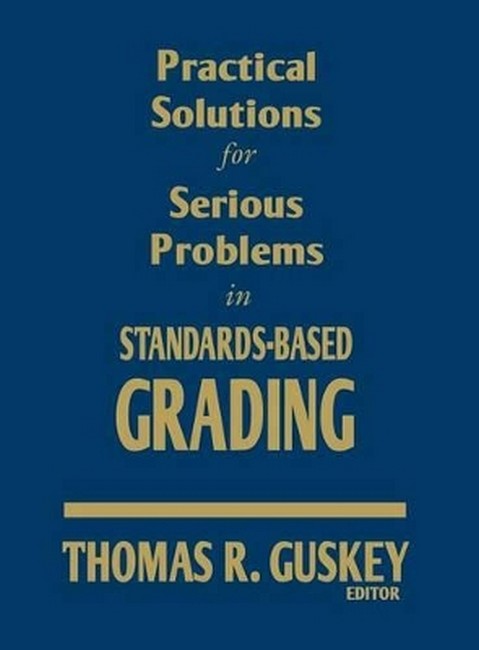Thomas R. Guskey, PhD, is Professor Emeritus in the College of Education at the University of Kentucky. A graduate of the University of Chicago's renowned Measurement, Evaluation, and Statistical Analysis (MESA) program, he began his career in education as a middle school teacher, served as an administrator in the Chicago Public Schools, and was the first Director of the Center for the Improvement of Teaching and Learning, a national educational research center. He is the author/editor of twenty-seven books and over three hundred articles published in prominent research journals as well as Educational Leadership, Kappan, and The School Administrator. Dr. Guskey served on the Policy Research Team of the National Commission on Teaching and America's Future, and on the task force to develop the National Standards for Professional Development. He was named a Fellow in the American Educational Research Association and was awarded the Association's prestigious Relating Research to Practice Award. He was also awarded Learning Forward's Outstanding Contribution to the Field Award and Phi Delta Kappan's Distinguished Educator Award. Perhaps most unique, in the 158-year history of his undergraduate institution, Thiel College, he is one of only three graduates to receive the Outstanding Alumnus Award and be inducted into the Thiel College Athletic Hall of Fame. His most recent books include Implementing Mastery Learning (2023), Instructional Feedback: The Power, the Promise, the Practice (with Smith & Lipnevich, 2023); Get Set, Go! Creating Successful Grading and Reporting Systems (2020), What We Know About Grading (with Brookhart, 2019), and On Your Mark: Challenging the Conventions of Grading and Reporting (2015). He may be contacted by email at guskey@uky.edu, Twitter at @tguskey, or at www.tguskey.com.
Request Academic Copy
Please copy the ISBN for submitting review copy form
Description
1. Introduction - Thomas R. Guskey The Difficulty of Change Background and Format Content Summary Our Hope References 2. Grading Policies That Work Against Standards...and How to Fix Them - Thomas R. Guskey Policy #1: Grading "On the Curve" Policy #2: Selecting the Class Valedictorian Policy #3: Using Grades as a Form of Punishment Policy #4: Using Zeros in Grading Policy #5: Hodgepodge Grading Summary References 3. The Challenges of Grading and Reporting in Special Education: An Inclusive Grading Model - Lee Ann Jung Why Does Special Education Grading Matter? Grading Adaptations Implications of Standards-Based Grading Inclusive Grading Model Step 1: Determine If Accomodations or Modifications Are Needed Step 2: Establish Standards for Modified Areas Step 3: Determine the Need for Additional Goals Step 4: Apply Equivalent Grading Practices to Appropriate Standards Step 5: Communicate the Meaning of the Grades Summary References 4. Assigning Fair, Accurate, and Meaningful Grades to Students Who Are English Language Learners - Shannon O. Sampson Challenges of Grading Students Who Are English Language Learners Special Considerations Accommodations Modifications Current Research and Knowledge Base Recommendations for Effective Communication Implications for Educational Policy and Practice Steps Toward Better Practice Communication Reflection References 5. Legal Issues of Grading in the Era of High-Stakes Accountability - Jake McElligott, Susan Brookhart Current Research and Knowledge Base What Is a Grade and Who Assigns It? Students and Legal Issues in Grading Due Process and Equal Protection Grade Reductions Confidentiality Teachers and Legal Issues in Grading First Amendment Liability Implications for Policy and Practice Confidentiality Grade Penalties Appeals Policies and Due Process Educator Responsibilities Recommendations for Improvement References Appendix 6. Fostering Consistency Between Standards-Based Grades and Large-Scale Assessment Results - Megan Welsh, Jerry D'Agostino Description of the Problem Overview of Standards-Based Grading in the District Understanding Teachers' Assessment Styles Assessing Most Standards Grading on Achievement, Not Effort Creating or Borrowing Assessments to Supplement Text-Provided Tests Tracking Performance Skill-by-Skill Focusing on Attainment of Standards Instead of the District Text Grading With End-of-Unit Assessments Other Grading Strategies Focus on Overall Achievement Frequency of Assessment for Grading Purposes Multiple Assessment Approaches Clear Grading Methods Implications Changes in Report Card Format Organizing for Standards-Based Grading Lack of Alignment Between District-Adopted Texts and State Standards Skepticism From Parents and Teachers Recommendations Approaches to Organizing Grade Books Using Diagnostic, Formative, and Summative Assessments Separating Content Area Grades From Effort Selecting a Method for Computing Grades Differentiate Teaching to the Standards From Teaching to the Assessment References 7. Synthesis of Issues and Implications - James H. McMillan Current Grading Practices Key Role of Teacher Judgment The Fundamental Purpose of Standards-Based Grading Validity of Standards-Based Grading Fairness in Standards-Based Grading Standards-Based Grading and Student Motivation Student Standards-Based Self-Grading Standards-Based Grading and Feedback Where Do We Go From Here? References Index
"A very well-written, well-researched work with excellent documentation. It is obvious the contributors are experts and have the ability to communicate their expertise well." -- Randy Cook, Chemistry and Physics Teacher "The book combines research, critical issues, and creative solutions in a concise and easy-to-read manner. While there is little doubt that educators today face a myriad of critical issues, this book allows educators to believe that they can be agents of change for students and for the profession." -- Sammie Novack, Vice Principal "Anyone with authority and influence over student grading policies should read this book. Educators have to be courageous and confront the inherent problems of traditional grading practices that are not working and that are harmful to students. Doing so requires a proactive approach to problem solving, which this book exemplifies." -- Paul Young, Science Department Coordinator

